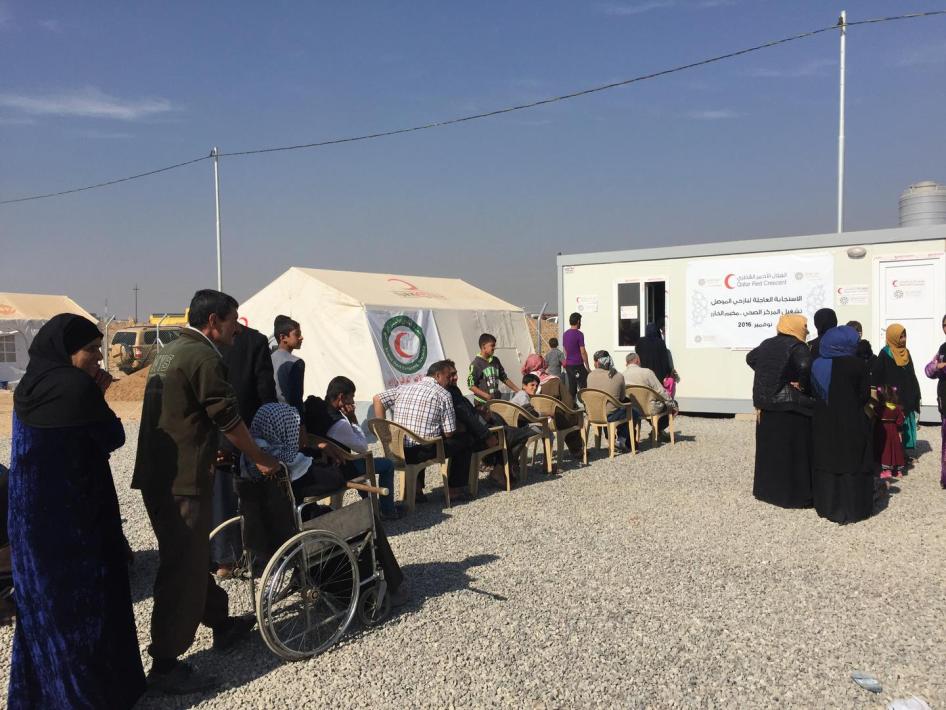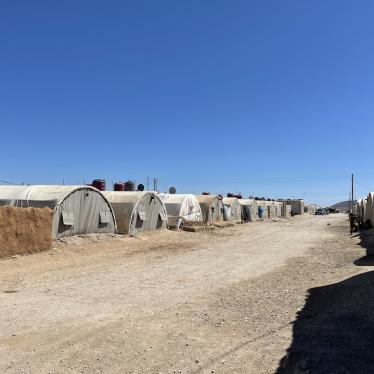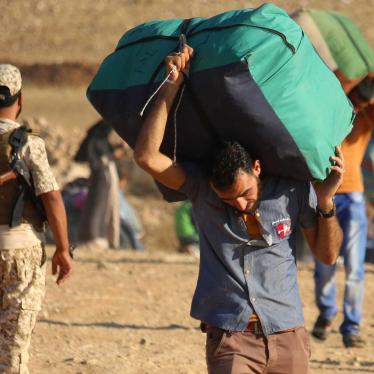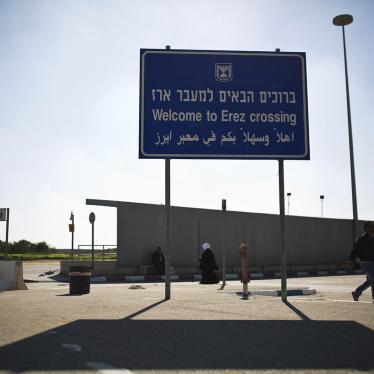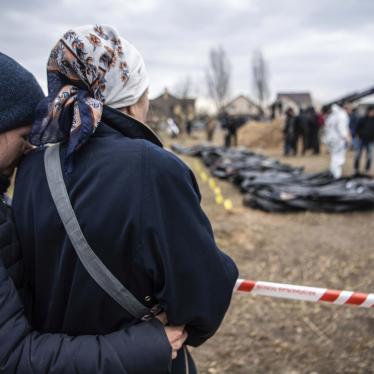For months, the humanitarian community in Iraq has been planning the Mosul response, which included efforts to accommodate possibly as many as 1.2 million civilians fleeing the fighting. Over the last two weeks, I have visited five camps housing the majority of the more than 33,000 people who have fled territory controlled by the Islamic State militant group (ISIS) since the military operations to retake Mosul began on October 17.
The first thing I have noticed is that as camps for displaced persons go, almost all of them are exceptionally clean and well-organized. Other camp characteristics, however, were more troubling. Perhaps the most flagrant violation I observed is that not a single Iraqi central government or Kurdistan Regional Government (KRG) camp for displaced persons from the Mosul operation that I have visited allows the displaced to freely move in and out, in violation of their right to freedom of movement.
Once they arrive at the camps, Iraqi and KRG authorities require that they live there and they restrict them from leaving at all, unless Iraqi or Kurdish security forces at the camp decide to transfer them elsewhere or they require emergency medical care. Guards at camp gates have told me either this is for the protection of the displaced, who might “get hurt” outside, or that it is for the security of those on the outside.
Echoing a sentiment held by many security force members, one Iraqi soldier escorting 200 new arrivals displaced from the outskirts of Mosul to the KRG-controlled Hasansham camp told me on November 6: “I tell you, at least one-third of these families are ISIS.”
In this regard, the treatment of displaced people from the Mosul operation is even worse than that of earlier waves of displaced people in two camps in the Kirkuk area. While they too have restrictions on their movement—they are only allowed to leave during daytime hours, in violation of their rights—they are not completely penned in.
It is shocking that after more than two years as de-facto prisoners under ISIS, though these families have been screened, they remain prisoners in their own country.
Restrictions of freedom of movement have impacts on another core right—the right to health. At each of the camps I have visited, I have come across more than one family with a relative suffering from a serious, long-term health problem. Many could not get proper medical treatment under ISIS. Now they are finally free, but because they are not allowed to leave the camps, many still cannot get the treatment they need.
The camps allow ambulances to take people out if they need emergency medical services but not if they have chronic life-threatening illnesses. And while there are medical clinics at the camps, according to the doctors working there, they are not equipped to deal with more serious illnesses like an infant I met who had a hole in his heart and needed urgent surgery.
One man from Gogjali, an eastern suburb of Mosul that Iraqi security forces recently captured, told me about his mother. She is paralyzed from the waist down, cannot urinate by herself, and needs regular treatment to stimulate her blood flow. Under ISIS in Mosul, he found her a clinic that every other day applied a treatment to maintain blood flow through her legs. Fearful for the consequences, he told me that since coming to the camp: “We have not been able to do the treatment for the last two weeks.”
At Zelikan, another KRG-controlled camp 29 kilometers northeast of Mosul, families who had arrived the first week in November said that not a single person in the camp was allowed to have a cellphone. Some of the people who just arrived told me that they were hopeful that after the Asayish, KRG security forces, checked the phones for any links to ISIS, they would get them back, but others, like a father who had been there 14 days, knew better: “We won’t be getting them back I don’t think.”
Asayish guards at the camp confiscated the phones at the gate when the families arrived. One guard at the gate told me, “We had to do this. First, it is a security issue, these people might call ISIS. The other issue is the young guys—they might take inappropriate pictures of the girls and post them on Facebook.” After over two years of being cut off from their friends and relatives who were not under ISIS, they are still cut off from the world at this camp.
The camp that concerns me the most is the one that has received over 6,000 displaced, the highest number of any of the camps I have visited. I spent the evening of October 31 at Jadah camp, 65 kilometers south of Mosul, under the control of Iraqi security forces. While at the camp I noticed that the camp management staff, made up of staff from a local NGO, appeared to be entirely male. I am worried this could inhibit the thousands of women there from accessing sanitary and health goods and services, including protection from sexual and gender-based violence.
While there, I also saw armed and uniformed men inside the camp. I witnessed a high presence of Iraqi security forces, National Security Service members (a Baghdad intelligence branch that answers to the prime minister), and Badr Brigade fighters, a prominent group within the Popular Mobilization Forces (PMF), also known as the Hashd al-Shaabi, armed with automatic weapons patrolling the inside of the camp.
While an armed police force may be necessary and legitimate—in particular, to secure the outer perimeters of a camp for the security of its residents—the presence of military elements in camps or settlements for internally displaced people or refugees jeopardizes their civilian and humanitarian character, and potentially exposes them to military attack.
Furthermore, a military presence may expose camp residents, particularly women and children, to serious physical danger and, especially men and boys, to forced recruitment. We have already documented how militias from two tribes recruited 250 men and boys from Debaga camp, 40 kilometers south of Erbil, where fighters move in and out freely.
While I understand the immense challenges facing the humanitarian community and Iraqi and KRG officials, a few simple measures, including allowing displaced people access to medical treatment for chronic illnesses, cellphones, and banning military forces inside camps, could go a long way to ensuring that the thousands of vulnerable families now living in camps are safe and cared for.

